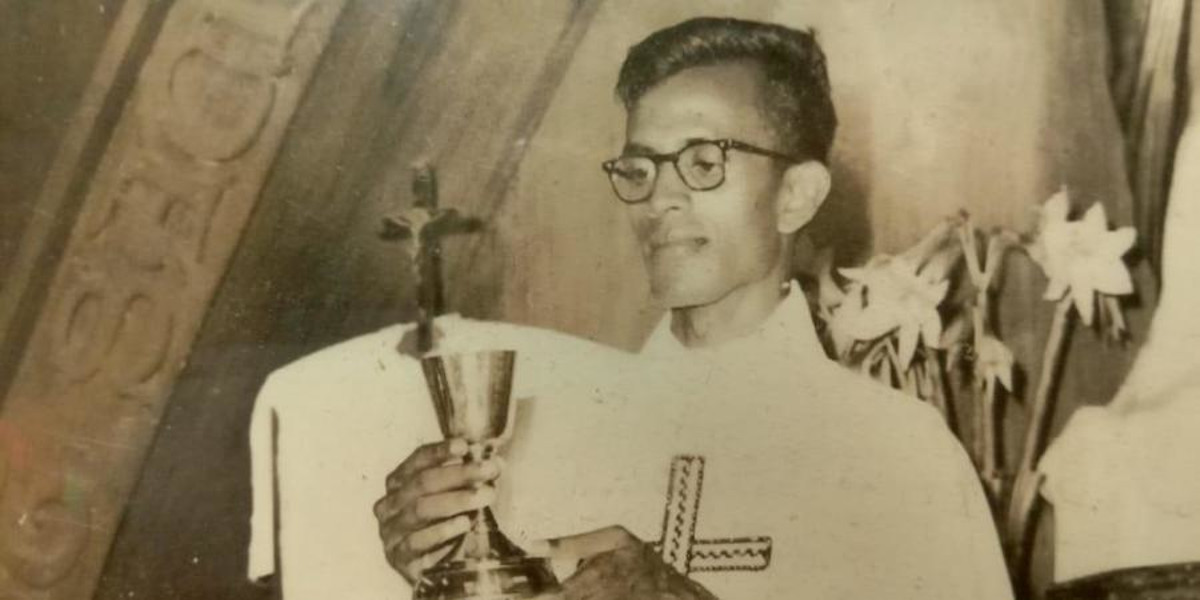
Fr Stan Swamy SJ as a young priest. Image from The New Indian Express
Fr Stan Swamy SJ studied theology in the Philippines, at Loyola School of Theology from 1967 until 1971. His former classmate, Fr Asandas Balchand SJ of the Philippine Province, remembers him in this personal tribute.
The first thing that comes very clearly to my mind is that he was a very good, studious Jesuit. I would go to his room and I would see him studying. Our setup then was very different because we had clear structures. We were expected to study from this time to this time–it was the old style, two hours’ study, then a one-hour class. I would pass by his room and see him studying; sometimes we had questions for each other. I remember that he was quietly friendly. He was reserved, but friendly. He was very easy to be with, very easy to get along with, for someone who was from “outside”.
The second thing I remember is that he had Parkinson’s. His hand would shake, but he didn’t really care about it, he just went on with his work. It was something that he lived with. It was difficult with writing–it was difficult to read his writing–but he just went on working. That’s my recollection of him–a good, serious student typing–it was typewriters at that time.
The third thing that I remember about him is his social dimension. I think a lot of the social work that came later. He would talk to me about the sessions he had with couples–it must have been from Marriage Encounter. He would talk about funny incidents he had when dealing with couples.
We were all ordained at the end of our third year (in 1970), that was the old style. And then you spent your fourth year preparing for your comprehensives or taking courses and doing pastoral ministry. I recall him doing priestly work.
A small thing to keep in mind is during that year in theology there were six of us: three from India, two from Sri Lanka, and I was the sixth. There was no native-born Filipino in the group, although I’m a Filipino citizen. So it was a very different atmosphere. It was very important for the group to get along with Jesuits who were younger and older. I did notice that we got along well with the others, in a quiet, reserved way.
I suspect that when he came here, he already had a strong social orientation. When I look at the group, I see another Indian who went very heavily into media. And then there was another one who went into pastoral rural work. And Stan Swamy was very strong in social work.
The Philippine Province helped him very much. We had Fr Benigno Mayo SJ who came after Fr Horacio De La Costa as provincial, and he was very strong in social orientation. I think Stan picked up a good bit from that orientation, and brought it with him to India, working with the Adivasis in the northeast part. I think he got a certain amount of that from here because the Philippine Province was very good about working with the poor, the marginalised, the indigenous peoples. It was a very strong orientation in him!
I went to India in 1975 to do my tertianship in an Asian setting. I’m very strongly pro-Asian, in favour of Asian spirituality. I wanted to do my tertianship in India with Tony de Mello. I was actually under another Jesuit named Tony Coelho who was trained by de Mello. When I was there I found out that Stan was working at the Indian Social Institute in the same city, Bangalore. I can still remember the address: 24 Benson Road! And I visited him–I went there and saw his work. The ISI was very well organised in Delhi and Bangalore where they did the outreach programmes. I found later he became director and was there for many years. And then he went up north.
Stan was remarkable for his social orientation. His fearlessness. He was not afraid. He would speak out. There were a lot of injustices against the Adivasis, by landlords and the government backing up the landlords. What I remember is that he was fearless, not afraid to speak out. Not afraid to take their side. And he would write; I would read his things. He went to Europe and talked to social scientists and theologians about this. That’s how I remember him–fearless, strongly committed to the social orientation. I remember keeping in touch with him and he would write these long inputs about his work, what he was doing and what the situation was in India.
I hope he’s honored by the South Asia Conference. It’s growing, it has a lot of very good men. It needs people who can give it a strong social orientation.






